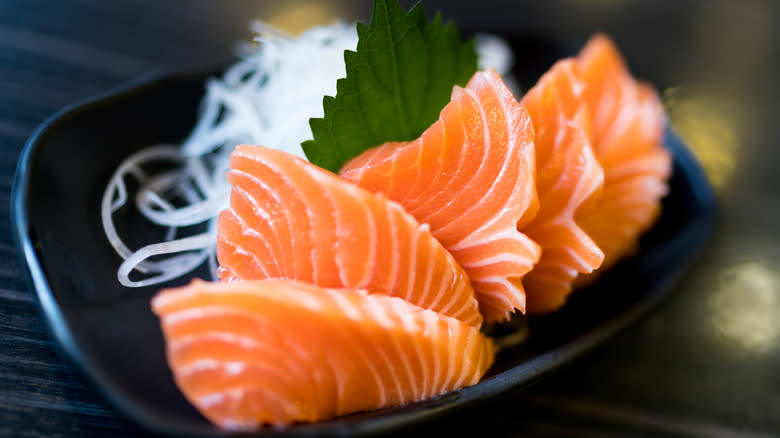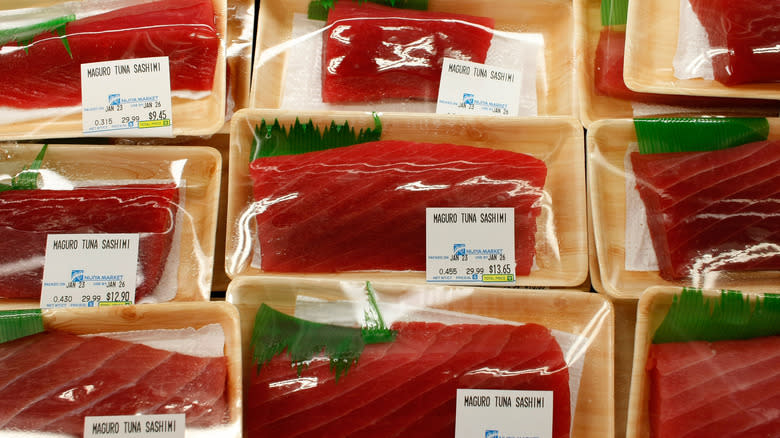The One Rule To Live By When Buying Fish To Eat Raw

It doesn't matter how experienced — or inexperienced — someone is in the kitchen, we all know that temperature is important. That ranges from the proper internal temperature for meats like chicken to keeping your refrigerator at the proper temp. Proteins are of the utmost concern, as anyone who's ever had a case of food poisoning can attest. It's completely understandable, then, that even the most adventurous home cook might hesitate to prepare raw fish themselves. Surely, it's not worth the risk ... right?
Eating raw fish at home can be perfectly safe, but it all comes down to the source and the quality. To ensure you get the best fish, you need to find a supplier who specializes in quality fish that you can trust -- one who knows how to safely handle and store raw fish.
If that sounds almost too easy, there are some things to keep in mind: Although finding a reputable fishmonger and not cutting corners — or sparing any expense — is technically just one rule, it's a big one that can require quite a bit of research. That initial search will only get you so far, and asking questions, visiting fishmongers in person, knowing what to look for, and spending the extra money to get high-quality fish are necessary to be sure you can enjoy raw fish at home while minimizing the risk of foodborne illness.
Read more: 12 Underrated Types Of Fish You Should Try At Least Once
Find A Reputable Fishmonger Who Sources High-Quality Fish

There are a few dangers to eating raw fish, including potential parasitic tapeworms. It's worth mentioning that the only guarantee that fish is safe is to cook it to the recommended temperature of 145 degrees Fahrenheit (per the USDA). However, finding a reputable fishmonger and paying for the highest-quality product they have is key to sourcing safe fish.
And here's the thing: Properly sourced fish that's safe to eat raw isn't going to be cheap, and you're going to want to go for fish like salmon, mackerel, seabass, and some types of tuna. Sure, there might be cheaper options on offer, but when you're eating it raw, it's not the time to look for a deal. Plan on spending a little extra money for the best they have, and be more confident in the fact that you're not going to regret it.
If you're visiting a fishmonger for the first time, there are a few things you can do to get an idea of just how fresh — and, ultimately, safe — the fish is. Look at all the displays on offer -- not just what you're interested in buying. Whole fish should be plump and firm with no overly fishy smell; their eyes should be clear and not foggy or sunken. Ideally, opt for picking out a whole fish and having it filleted while you're there, and that's going to go a long way in making sure you're getting the real deal.
How To Pick Fish That Are Too Large To Display Whole

In some cases, it's just not possible to see the whole fish when you're buying something to eat raw. For example, tuna is a popular choice, but you're unlikely to see a full-sized specimen hanging in a fishmonger's window. Albacore can, after all, be more than three feet while bluefin is typically caught when they're around six feet long. So how do you know what to look for when the fish has already been cleaned?
Our golden rule still applies: Don't cut corners and opt for lesser-quality fish at a lower price point. Color can be a great indicator of freshness: Look for a bright, vibrant colors, and if there's any gray? Walk away. If there's slime, the fish isn't fresh and should not be purchased.
When The Daily Meal reached out to Chef James Dumapit for some suggestions on picking out the best sushi-grade fish, he had some invaluable tips. Dumapit — who is a chef and partner at Bar Miller in New York City — advised asking for farm-raised instead of the wild-caught variety. Why? Farm-raised fish are less likely to carry parasites.
Again, he stressed the importance of finding a reputable, experienced fishmonger who carries high-quality fish, knows their stock and sources, and observes the best practices that keep everyone safe. That might end up costing you a little more, but it's worth it to stay safe and serve up the best quality fish possible.
Read the original article on The Daily Meal.

 Yahoo Lifestyle
Yahoo Lifestyle 
